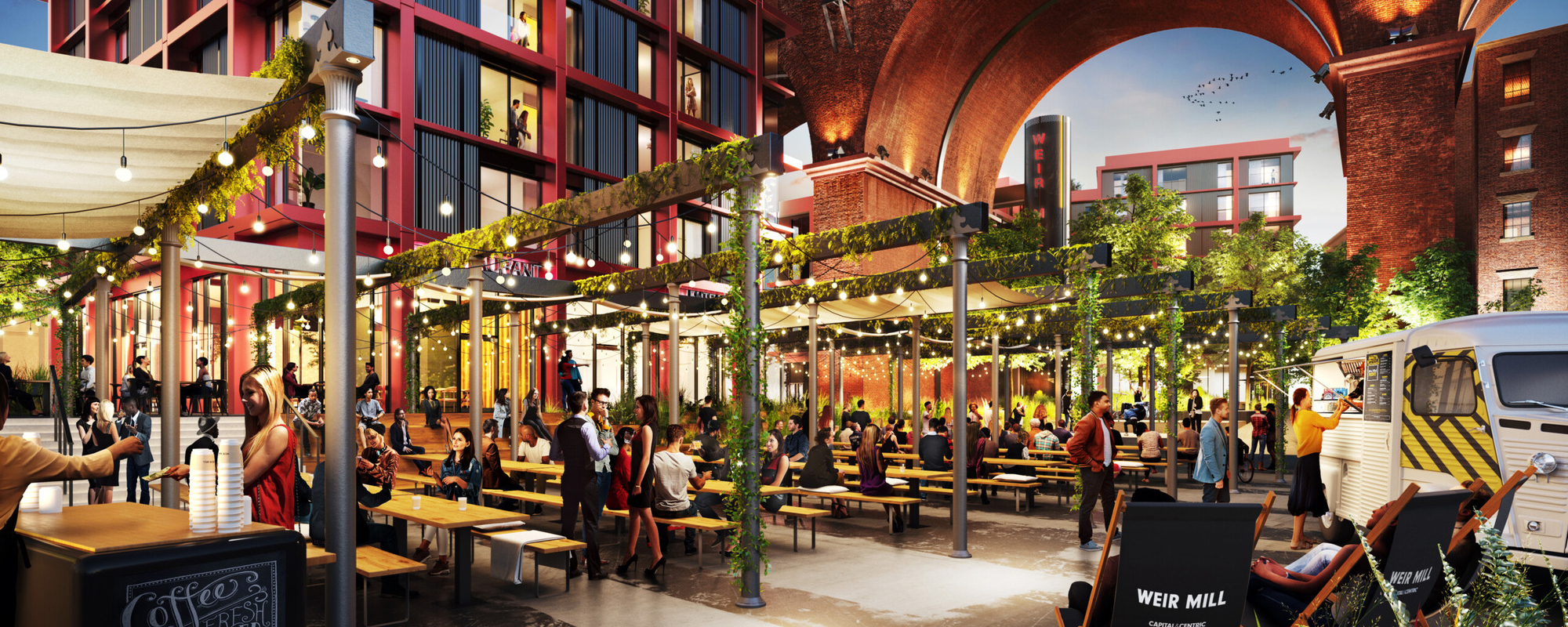Get updates from The Developer straight to your inbox Yes, please!
Stockport’s Weir Mill: These buildings have stories to tell
Turning historic buildings to new use, Tim Heatley, co-founder of developer Capital&Central, and Mark Braund, architect director at BDP talk about creating a new community out of an historic mill and bringing apartment-living to the suburbs

“If you’re going to attract anybody from the city centre to the suburbs, you need a version of city-centre living. These aren’t houses with your own front door, they’re apartments,” says Tim Heatley, co-founder of developer Capital&Centric. “They need a great gym, great coffee, great co-working spaces, a cool apartment.”
We’re talking about Weir Mill in Stockport for an episode of The Developer Podcast. The £60m project to transform an historic mill complex into a community of 256 apartments with co-working offices, amenities and public spaces, and a renewed connection to the Mersey riverbank.
“That’s one of the big starting points, to unlock the river Mersey,” Heatley says. “Not many people realise that the river Mersey runs through Stockport. Let’s make that the driving force behind the scheme, get people into the landscape, get people experiencing the history, and make this a new start.”
The complex will transform two historic mill buildings into apartments and add multiple new buildings, while demolishing some of the complex as well. The new buildings are designed to emphasise their engineering in tribute to Victorian infrastructure, while public spaces are intended to welcome the wider community in, and create a hub for Stockport. “One of the things Covid has been useful for is reminding us why architecture is important, and why public space is important,” says Heatley.
Mark Braund, the architect director at BDP leading the design at Weir Mill, says one of the unique characteristics of the site is the layers of history, because mill complexes were out built over time: “There are even remnants of a wheel house that drove the mill before steam engines, too dangerous to access now, with a bit that’s probably still sitting in under the Mersey today, with timbers from the original water wheel.”

Heatley says it’s unusual for Capital&Centric to work with a large architecture practice such as BDP, who are “much bigger” than the developer as a company. “It’s about the individual. Mark gets it, and that’s important. That person has to have passion and sit alongside you.”
That passion extends to working with older buildings: “A lot of our previous projects involve existing buildings. They have real character to them and that creates a challenge that requires you to have more innovative solutions and be creative. We like that.”
Heatley says VAT reform – refurbishment is taxed where new-build is not – would remove the incentive to demolish: “It’s much easier to keep a building and repurpose it and bring it back to life than it is to tear it down, munch it to pieces, dig it into the ground and put a new building above it.
“That seems just nuts to us, it always has. It destroys value. It destroys the climate unnecessarily. Look, I’m not an ecowarrior – that’s just common sense.”
Become a proud supporter
Find out more about how you can support our campaigning journalism get free tickets to all our events, including Festival of Place: Social Impact, which runs 1-3 March online and next summer's in-person Festival of Place
Sign up to our newsletter
Get updates from The Developer straight to your inbox
Thanks to our organisation members
Become a member
© Festival of Place - Tweak Ltd., 124 City Road, London, EC1V 2NX. Tel: 020 3326 7238
